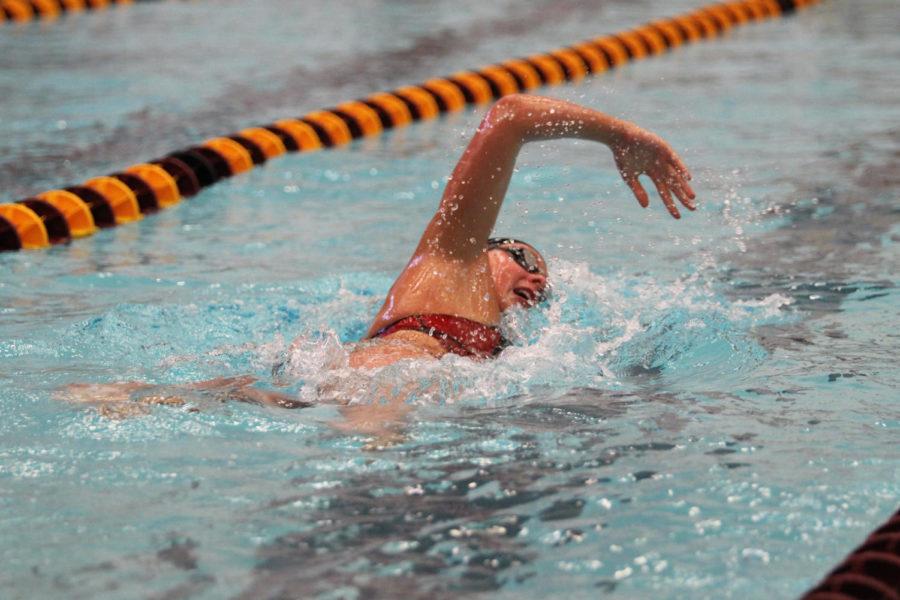Swim managers make a splash with dedication on dry land
October 22, 2019
There is a lot contributing to the success of a college sports team — an athlete’s athletic ability, a coach’s dedication to their players and the long hours of practice — but what many people don’t know about is the unsung heroes of the team: the managers.
Senior Jessi Storer and sophomore Jess Hartwig are the managers for the Iowa State swimming and diving team.
Storer and Hartwig are given many tasks throughout practices and during meets.
“I help time if Duane [Sorenson] and Kelly [Nordell] need help,” Storer said. “Sometimes the other manager and I clean up some areas or make it more organized, just to make everybody’s life easier.”
They also fix things that may be broken, and are there for whatever the coaches need help with.
“They help organize all of our swimsuits, swim caps, warm ups,” said head coach Duane Sorenson. “Sometimes it’s a little bit of everything.”
Managers also travel with the team to away meets, help keep time at meets and film the meets or get the results. Sorenson said they also get splits at the meets. Splits are the time after every length, which is usually every 50 yards.
“Basically you’re timing the swimmers at the meet so they know when they come out, ‘ok I did really well on the first three 50’s of my race but my fourth 50 was way off — that’s what I need to work on,'” Sorenson said.
Additionally, the managers help the athletes individually.
“They usually time us in practice, which is really nice,” said sophomore swimmer Elynn Tan. “They’re just nice to be around; whenever you need something, they help you out.”
Timing and quick runs to get water aren’t the only thing the managers do for the swimmers. They can also be there to encourage and give advice, like Storer sometimes does.
“The upperclassmen when I was a freshman were always good about [giving advice],” Storer said. “I just want to be as useful as I can and helpful and encouraging, because that’s what I was given.”
Storer wasn’t always a manager. She was a swimmer her first two years at Iowa State, swimming the distance freestyle and butterfly and the 400 individual medley.
She became a manager because after her sophomore season, she got hurt and was put on permanent medical, meaning she still had to be involved in athletics in some way to keep her scholarship.
“I’m still part of the team; I just can’t participate anymore because of my injury,” Storer said. “I kind of got put in the role of student coach/manager, which has been really fun because I’ve been able to still be with my teammates every single day and help encourage them in a different way.”
Storer said that although it’s tough at times to be around the sport but not be able to swim, it still helps in her transition to be there. She said it’s hardest at meets, especially when her races would come up, but she knows it’s what’s best for her and she likes to help the other swimmers do their best.
“It’s fun because I get to surround myself with everybody,” Storer said. “I swam for a club in high school, so this was my first ‘team’ experience, so it’s been good getting close to the girls. It’s not that we’re just a team — we’re a family.”
Certain traits will allow a swim manager to be more successful and helpful than others.
“They have to take initiative a lot of times,” Sorenson said. “They have to have a good personality and can’t have an ego when people are asking for things.”
Although managers may not always have the most glamorous jobs to do, they are still very important to the team’s success.
“They are extremely valuable, the unsung heroes,” Sorenson said. “They do a lot of grunt work — it’s stuff that’s very important things that need to get done behind-the-scenes. You don’t think it’s a glamorous position, but it’s very important.”
















